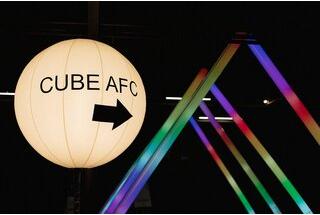Laurent Machuel, Deserts
By Ariane Damain Vergallo for Ernst Leitz WetzlarA singular sight for ordinary mortals, a beautiful vision for a nature lover and a sublime image for a cinematographer.
Carrying some of his still cameras, he has come to this white desert looking for answers. A best friend gone and a great love affair turned sour are the painful ordeals he has to overcome with the sole support of an irrational attraction for infinite spaces where light encounters no obstacle.

In 1972, Laurent Machuel is around twelve when his father, Emmanuel Machuel, then assistant camera operator to the great cinematographer Nestor Almendros, leaves for three months to shoot Barbet Schroeder’s The Valley in Papua New Guinea. It is an almost virgin, barely discovered territory in which primitive tribes of Papuans dwell.
His father’s black-and-white photographs fascinate him.
From then on, he will have but one dream : traveling, going where the wind takes him, leaving behind the school where he feels more than unhappy : an alien.
After failing (twice) to pass the competitive entrance exam for the Louis Lumière Institute, he hears of a school in England - the National Film School - that recruits solely on the presentation of a photo portfolio. A good enough excuse for him to go and visit the movie sets his father often told him about.
Nestor Almendros and François Truffaut allow him to take pictures on the set of Le dernier métro (The Last Metro) which stars the two major icons of French cinema at the time : Catherine Deneuve and Gérard Depardieu. If Laurent Machuel is barely aware of his luck, he immediately feels at home on that set — “like a fish in the water”, happier than he has never been.
One day, while visiting the set of Claudio Guzman’s The Hostage Tower (“A criminal takes hostages on the Eiffel Tower in Paris”, as IMDB sums it up), he meets another cinematographer, Jean Boffety, who instantly offers to take him as camera intern. The very same day - call it lightning serendipity — he gets a letter from the National Film School informing him that it accepts him as a film student.
"In less than a second, I decided to ditch the school and go work directly on films, learning as I’d go along."
Laurent Machuel is first trainee then second camera assistant on Claude Sautet’s Un mauvais fils (A Bad Son) and Garçon, both lit by Jean Boffety.
At the time, cinema made an overwhelming use (and abuse) of zooms —which, somewhat perversely, made the position of second camera assistant all the more interesting. For zooming requires one to stand right next to the camera, and therefore right next to the camera operator, to the director and especially to such actors as Yves Montand or Patrick Dewaere whose importance Machuel hardly measured at the time.
In the 1980s, young men were haunted by the prospect of a compulsory military service to be enrolled in by the age of twenty-two. As that deadline approached, they would get increasingly nervous and concoct the weirdest strategies to avoid being called by the armed forces, simulating ‘’deviant’’ inclinations or plain madness to be declared unfit for military service, or at least to integrate the (separate) Military Film Unit or perhaps the foreign aid service.
Remembering his childhood dreams, Laurent Machuel besieges the (French) State Department and at the eleventh hour, is allowed to go spend a year in Khartoum, Sudan.
One year with no turning back. That will radically change his life.
"Having been pampered and overprotected my entire life, I found myself thrust into the deep end".
He shares a house with a bunch of adventurers who introduce him to the delights of taking off on the spur of the moment and exploring unknown territories. So enthralling is that experience that, back from Africa, he seriously considers dropping cinema entirely to join them. Luckily, he changes his mind and over the following five years, shoots film after film as camera assistant, gets into a relationship, fathers a son.
He is twenty-nine when he meets legendary photographer Raymond Depardon who is about to shoot in Columbia his first commercial as director for Naf Naf, an offbeat clothes maker whose emblem is a pig. (How very 1990s !)
It is (professional) love at first sight that leads to an unexpected and undreamt of proposition. Depardon offers Machuel to accompany him in the Niger desert to shoot his first fiction film, La Captive du désert (Captive of the Desert), starring Sandrine Bonnaire. A twelve-week shoot in a tiny crew of ten. Depardon directs and operates the camera, Machuel takes care of... everything else. He is fascinated by the photographer’s radicalism : who else would choose never to move his camera and stick to such fixed shots as that majestic nine-minute one where a caravan of camels simply passes by under a blazing sun ?
Back from Niger, Machuel leaves wife and child. "That shared adventure with Depardon plucked me out of my life, such as it was." He buys a Leica M4-P and decides to return, by himself, to Sudan to take photographs and, perhaps more importantly, to renew with the desert he loves so much. "Time slows down and stretches to infinity there ; everything is calm and the silence forces you to be humble."
But back from Africa, the cinema grabs hold of him again — and won’t let go for the next twenty-five years. His last film as camera assistant is Claude Lanzmann’s documentary Tsahal, shot in Israel (again, not too far from a desert).
With his Leica M4-P, he photographs everything : the tank factories, the Israeli Army’s general staff and the Gaza Strip, never suspecting that Claude Lanzmann would absolutely veto the publication of those photographs, thereby nipping in the bud the prospect of Machuel potentially turning into an independent photographer.
Laurent Machuel is thirty when he makes his debut as cinematographer on Xavier Durringer’s La Nage indienne (Sidestroke). He meets a young actress making her own film breakthrough, Karin Viard.
Over the next twenty-five years, he will watch her turn into a major (and most versatile) star in French cinema, a popular icon... and the mother of his two daughters.
Machuel’s filmography is two-fold :
One encompasses a whole series of ‘’auteur films’’ shot ‘’the hard way’’ (read : with the lightest budget and in the harshest conditions), mainly with producer Paolo Branco, an undisputed specialist in that, er, respect.
All of them interesting films, no doubt, but ultimately ones that hardly reach an audience, however small. Quite a frustration for a young cinematographer whose wife is experiencing a meteoric rise.
But the gods also keep an eye on Laurent Machuel. On the set of a TV film shot in Lebanon, he befriends director Merzak Allouache who offers him to light his next film, Chouchou, starring actor Gad Elmaleh. The film will be a huge success, with four million entries in France alone.
There begins the second part of Machuel’s career.
It will be marked by comedies that turn out to be both critical and box-office hits, helmed by such idiosyncratic directors as Niels Tavernier or Maurice Barthélémy with whom Machuel shot Papa and, recently, Les Ex. Unusually subtle and constantly unexpected works. "Maurice Barthélémy is both sunny and grave, sometimes at the very same moment".
Laurent Machuel has just wrapped Christophe Duthuron’s Les Vieux fourneaux, based on a graphic novel that tells the story of three octogenarian anarchists played by Eddy Mitchell, Pierre Richard and Roland Giraud. In stark contrast with the traditional shrillness of most comedies, Les Vieux fourneaux explores and details the characters’ deepest personalities.
Machuel shot it with Leica’s Summicron-C lenses because he wanted to get as close as he could to the drawing style of the graphic novel. "For the first time, I felt a surge of interest in working only with fixed focal lengths". Perhaps an oblique tribute to Raymond Depardon who gave him his big break and who is also a worshiper of both the fixed shot and Leica equipment in general.
"With their short focal lengths, the Summicron-Cs worked great on close-ups, both for the old anarchists’ mugs and for the beautiful (and young) actress Alice Pol".
As any (and every) filmmaker will tell you (when pressed), not knowing what tomorrow may bring you can often be productive. Hence, Laurent Machuel’s renewing with photography after setting it aside for the longest time.
"What I like about photography is the way the subconscious ends up inhabiting the images."
Re-Set is the title of his latest photograph book.
Reset(ting)... Isn’t that what he always did - and will possibly always do ?
(Translated from French by Henry Béhar)
 En
En Fr
Fr







